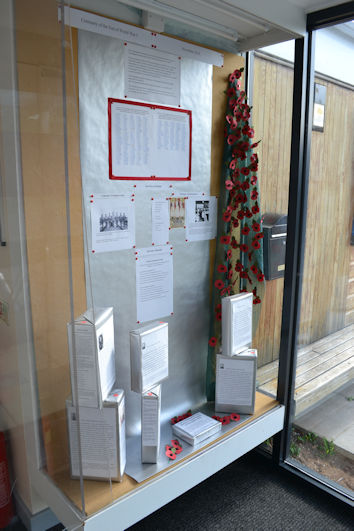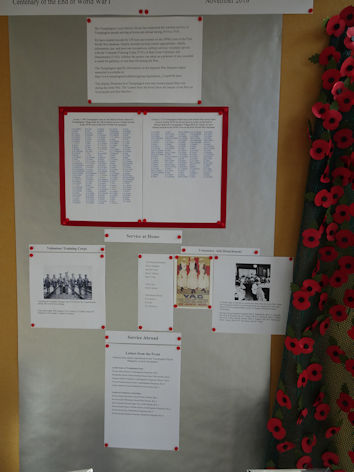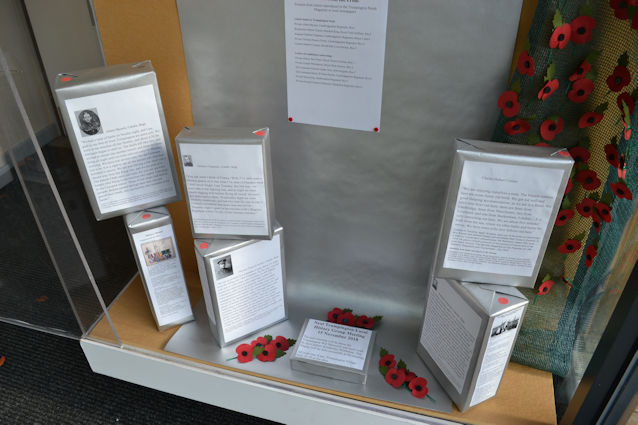The centenary of the end of World War 1 was marked by the Trumpington Local History Group with a display in the foyer of Trumpington Pavilion from 11 October – 13 November 2018.
The display drew on the findings of the Group’s IWM-Lives of the First World War project, which itself will come to an end in March 2019. The display was produced by Wendy Roberts.
Introduction
The Trumpington Local History Group has researched the wartime activity of Trumpington people serving at home and abroad during 1914 to 1918.
We have created records for 278 men and women on the IWM-Lives of the First World War database. Details recorded include (where appropriate):- family information; pre- and post-war occupations; military service; voluntary service with the Volunteer Training Corps (VTC) or Red Cross Voluntary Aid Detachments (VAD); whether the person was taken as a prisoner of war, awarded a medal for gallantry or lost their life during the War.
There is information about the Trumpington specific records on the Imperial War Museum digital memorial on the Lives of the First World War page.
The display illustrated how Trumpington men and women played their role during the Great War. The ‘Letters from the Front’ show the impact of the War on local people and their families.
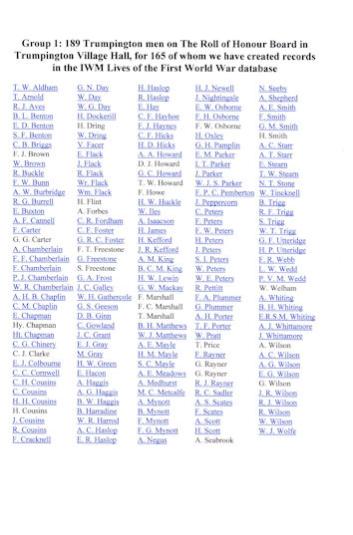
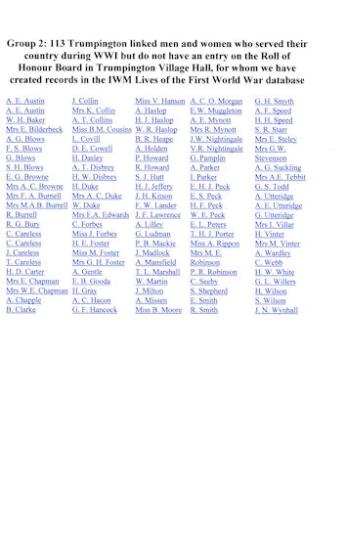
Service at Home
Volunteer Training Corps
A number of Trumpington men were in a local group of the Volunteer Training Corps.
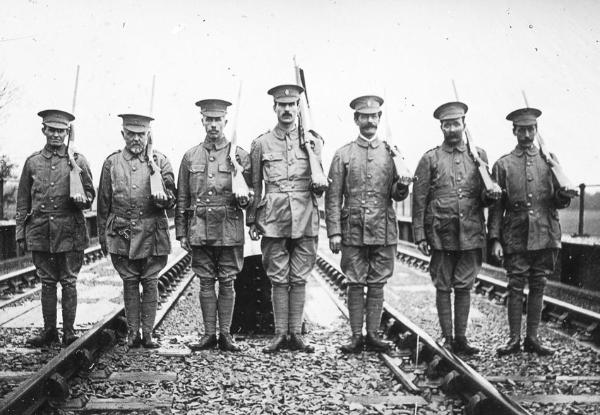
From left to right: W.R. Haslop; T.H.J. Porter; P.J. Collins; Sergt P.R. Robinson; F.W. Lander; I. Parker; R. Haslop.
Red Cross Voluntary Aid Detachment
VAD Nursing Members:
Mrs E. Chapman
Miss M. Foster
Miss V. Hanson
Mrs I. Villar
VAD Cook:
Mrs R. Mynott
VAD Motor-Drivers:
E.G. Buxton
H. Duke
J.F. Lawrence
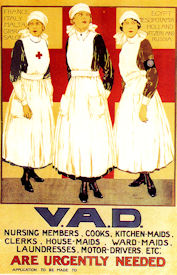
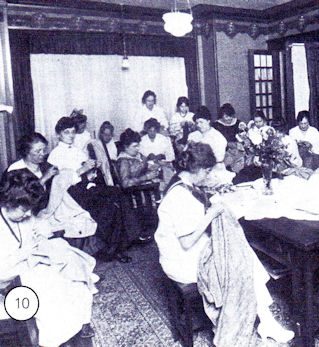
A similar sight to that above would have been seen at Anstey Hall, when the Trumpington Red Cross Working Party met regularly to make and mend for the wounded soldiers at the 1st Eastern General Hospital, Cambridge.
Sewing Group members included: Mrs E. Bilderbeck, Mrs F.A. Burnell, Mrs M.A.B. Burrell, Mrs A.C. Duke, Mrs F.A. Edwards, Miss J. Forbes, Mrs G.H. Foster, Miss B. Moore, Miss A. Rippon, Mrs M.E. Robinson, Mrs E. Steley, Mrs G.W. Stevenson, Mrs M. Vinter
Samples of Letters from the Front
Extracts from letters reproduced in the Trumpington Parish Magazine or local newspapers. These and other letters are included in the Lives of the First World War records about Trumpington people.
Letters home to Trumpington from:-
Private Albert Mynott, Cambridgeshire Regiment, Box 1
Bombardier Bertie Charles Marshall King, Royal Field Artillery, Box 2
Sergeant Herbert Chapman, Cambridgeshire Regiment, Boxes 3 and 6
Private Thomas Francis Porter, Cambridgeshire Regiment, Box 4
Charles Hubert Cousins, British Red Cross Society, Box 5
Corporal George Blows, 88th (East Anglian) Field Ambulance, Box 7
Letters of condolence concerning:-
Private Sidney Ilett Peters, Royal Welch Fusiliers, Box 1
Private Joseph Whittamore, Royal West Surreys, Box 2
2nd Lieutenant Edward Jasper Gray, Rifle Brigade, Box 3
2nd Lieutenant Henry William Huckle, Cambridgeshire Regiment, Box 4
Private Newns Day, Bedfordshire Regiment, Box 5
Private George Frederick Hancock, Hampshire Regiment, Box 6
Private Sidney Herbert Blows, 7th Border Regiment, Box 7
Box 1
Albert Mynott, Cambridgeshire Regiment
“We had a taste of battle on Sunday night, and I am glad to say that all from Trumpington are quite safe. We were in the trenches all day Sunday, and about 4.30 the Germans began to shell us. The shells fell like rain, and we had to retreat into another trench, and there we were firing all night until we were relieved early on Monday morning. We have lost several men, but the Germans lost a lot. It is a sight to see all the houses and churches knocked to pieces. We are now having a few days’ rest a decent way from the firing line, and we are glad of it. The parcels I had came just right, for you see we were hungry after being in the trenches two nights. I am glad to say I escaped unhurt. Three of our chaps had narrow escapes. Bullets passed through their hats and just grazed their heads, and one had his rifle smashed in his hands.”
A part of a letter dated 1915 from Private Albert Mynott, of the ‘A’ Company, Cambs. Regt., to his mother, Mrs Mynott, of a thatched cottage adjacent to The Coach and Horses Inn, London Road, Trumpington. Source: Cambridge Independent Press, Friday 2 April 1915 p.6.
Sidney Ilett Peters, Royal Welch Fusiliers
“I fear I have to tell you that your son, Pte S. Peters, of my company, was killed in action on Nov. 9th. He is buried in an English churchyard, about 2 miles behind the front line, with other heroes of England who too have given the supreme sacrifice for us all, and a cross has been erected over his grave. He had been with me now for some time, and I assure you that we have lost a very gallant soldier and Englishman. He was always cheery, never grumbled and was a great help to us all out here, for, added to these, he was a hard worker. A shell dropped very close to a small party, who were working on a road, and fortunately death for him was instantaneous – a true soldier’s death. The whole company have sustained a loss and will miss him, and all ranks, officers, NCOs and men, desire me to convey to you their deepest sympathy in your great loss, and I sincerely hope that you will be given strength not to grieve over his death, but rather look back on him with pride, for ‘How can man die better than facing fearful odds’.”
Extract of letter from the army company captain to Sidney’s mother, Mrs H. Peters, Church Street, Trumpington. Source: Cambridge Independent Press, Friday 8 December 1916 p.5
Box 2
Bertie Charles Marshall King, Royal Field Artillery
“Dear Mother and Father, – Just a few lines to let you know that I am in the best of health. You will see by above address that I am attached to the Brigade Headquarters for the time being, as mounted orderly. I have to carry despatches about. The job is all right, but the worst of it is we are likely to be called out any moment of the night. It is all right riding about; one thing you can see what is going on, but you must not get in the way of the bullets! The Germans blew up a mine under one of our first line trenches to-day, and of course they had to use some of their gas. I saw some of our chaps brought in. They must have been in dreadful agony. One thing being in the artillery, when they use gas you do get a chance to get your helmet on in time. I see by the ‘Chronicle’ you sent me that you have had the Zeps over London again, and rather a lot of lives lost. Have not received parcel yet, but expect I shall receive it tomorrow. Please do not forget to send ‘Chronicle’ every week, as I like to read a bit of local news.”
The following letter was sent by Bombardier B. C. M. King, No. 38828, 84th Brigade, R. F. A., Attached Brigade Headquarters, British Expeditionary Force, dated October 24th, 1915. He was the son of Mr A. W. King, North Cottage, Trumpington. Source: Cambridge Chronicle, 3 November 1915 p.6
Joseph Whittamore, Royal West Surreys
“In Hospital:– Pte. J. Whittamore of the Royal West Surreys, whose removal to a field hospital owing to severe wounds received on the Western Front some few weeks ago was duly chronicled, is, we are sorry to report, not getting on so well as could be wished. A letter to his wife at Stopsley mentioned that his leg was then progressing favourably, but a later one received this week states that unfortunately it is not going on at all well. His many friends will hope for better news of Pte. Whittamore’s progress, who is still in hospital in France, his removal to England being at present impracticable. He states that he had a very rough time after being wounded. A comrade helping him along was obliged to desist and leave him in a shell-hole while he went for further aid, owing to the heavy firing of the enemy. The comrade, however, did not return or any help arrive, and in this hole the poor fellow actually stayed for four days, being eventually found by an Australian officer, when relief and comfort to Pte. Whittamore were promptly rendered.”
Joe Whittamore of Rose Cottage, Trumpington, and compositor at Cambridge University Press. Source: Luton News and Bedfordshire Advertiser, Thursday 8 November 1917, p.7
Box 3
Herbert Chapman, Cambridgeshire Regiment
“On Sunday evening until 5 a.m. on Monday we had an awful experience. We were in a shattered village close to the firing line, billeted in cellars, when an attack began, About ¼ to 5, just as we had finished tea and were getting prepared to take over a line of trenches, we were subjected to a frightful bombardment. We heard that the Germans had broken through and were ordered out to support troops to stop them. If we do come back none of us will forget that advance; after advancing, retiring, and advancing again the enemy were checked and held up again. About 5 a.m. we were relieved by Regulars, and went back out of the firing line. We had to scuttle out of danger, leaving our packs behind. Last night I took out a party from my platoon to get them on a cart, but we found most of them had been pillaged, and most of our things taken.”
An extract from a letter to Mrs Chapman from her husband, Sergt. H. Chapman (1st Cambs), dated March 16th 1915. Source: The Monthly Magazine for the Parishes of Little Shelford, Stapleford and Trumpington, May 1915
Edward Jasper Gray, Rifle Brigade
“… He was searching very pluckily for a sniper who had been causing much trouble, when he himself fell a victim. Death must have been instantaneous. Our Division has won to itself great glory, but the cost has been very high. All the officers grieve over the loss of your son, whose honest, quiet fellowship was so much appreciated. The men also speak feelingly of his good sense and kind interest in their welfare.” Sec.-Lieut. Gray, who was 20 years of age, was educated at Winchester College, which he left in October 1916. He joined the Army almost immediately and went to France in June 1917.”
Extract from a letter to Edward’s parents, Dr and Mrs Gray, 10 Chaucer Road, Trumpington, from the army chaplain. Source: Cambridge Daily News, Monday 8 April 1918 p.3
Box 4
Thomas Francis Porter, Cambridgeshire Regiment
“We are at present in a Canadian Camp about 3½ miles from the firing line. Our Company, by the way, was the only one to come here, and of course we felt highly honoured, especially as last night they called for volunteers, and 15 of our platoon, myself included, were detailed to proceed to the trenches with wire-entanglements and spades. We started about 6.20, and arrived at our destination safely, although there were plenty of bullets whistling overhead. Our job was improving a trench about 300 yds. from the German trenches, and although not under direct fire, as the Germans were unaware of our presence, yet there were plenty of stray bullets and shots from snipers, and one or two had narrow escapes, but fortunately we all returned safely. Some of us are going again tonight, and I hope the good fortune holds.”
Mr Tom Porter (1st Batt. Cambs. Regt.), writing March 3rd 1915 to his relatives, Quy Villa, Cambridge Road, Trumpington. Source: The Monthly Magazine for the Parishes of Little Shelford, Stapleford and Trumpington, April 1915
Henry William Huckle, Cambridgeshire Regiment
“It is with deepest sympathy that I send the sorrowful news that your husband, Lieut. H. W. Huckle, of the Cambs. Regt., passed away on the 6th, killed in action near ____. He went in with his company on the morning of the 6th. Immediately some enemy machine-guns opened fire upon them. Mr Orbell, the company commander, was instantly killed. Your husband then led the company on, when he too was hit in the left side by a bullet which penetrated his body and killed him instantly. We carried his body to ____, where we buried him close by the broken church and village. Your husband had done his day’s work, and he had done it well and bravely.”
Extract from the army chaplain’s letter to Henry’s wife, Mrs Huckle of Tourmaline, [182] Shelford Road, Trumpington. Source: Cambridge Independent Press, Friday 20 September 1918 p.8
Box 5
Charles Hubert Cousins, British Red Cross
“We are enjoying ourselves a treat. The French soldiers here are some funny old birds. We get fed well and good sleeping accommodation, as we are in a Hotel. We have nine boys out here; there are three from Cambridge, three from Manchester, two from Liverpool, and one from Beckenham, London… It is very interesting out here. We are about five minutes’ walk from the sea, where we often bathe and bump the waves. We have some jolly nice fellows out here.”
Charles H. Cousins, aged 16 years, was one of the three ex-Cambridge Boy Scouts who served initially with the British Red Cross in Dunkirk. In a letter to Trumpington schoolmaster, Mr Robinson, dated 14th June 1915, he gave a cheerful account of his journey to France and of his work there. Source: The Monthly Magazine for the Parishes of Little Shelford, Stapleford and Trumpington, July 1915
Brothers and sister serving in H. M. Forces
Sergeant Cyril Williams Cousins, Royal Engineers, 44418; Private Henry Herbert Cousins, Lincs Regt. 4427 and then Essex Regt. 40615; Lance Corporal Reginald Cousins, Army Cyclist Corps. 2866; Charles Hubert Cousins, British Red Cross and then a Private in London Regt. 568058; and Beatrice Mabel Cousins, Women’s Army Auxiliary Corps, Service No.24864
George Newns Day, Bedfordshire Regiment
“I am writing to condole with you in your great loss of your splendid son. I can’t tell you how sorry I am about it, and how much I missed him. He was my orderly, and looked after me splendidly, and was greatly beloved in the regiment by everyone. I am glad to tell you that he did not suffer, and was quite unconscious to the end. The same shell hit seven men. It was so unlucky that he should have been hit in the head. Please accept my sincerest sympathy. He did his duty nobly.”
Extract of letter from the Commander of the Regiment to his mother, Mrs W. Day, Church Street, Trumpington. Source: Cambridge Daily News 11 January 1917
Box 6
Herbert Chapman, Cambridgeshire Regiment
“You ask what I think of France. Well, I’ve only seen a fleeting glance of it; but what I’ve seen of Flanders mud I shall never forget. Last Tuesday, the 2nd inst., we were sent to the fighting line, and at night we were trench digging with bullets flying all round; we soon got quite used to them. Wednesday night we were similarly employed, and had two men hit, one dying: it is simply wonderful that more men are not hit. Thursday night I spent in the trenches with a Regular Regiment within 70 yds. of the German trenches.”
An interesting letter to Mr R. Haslop, London Road, Trumpington, dated March 10th 1915, from Sergt. H. Chapman (‘B’ Company, Cambridgeshire Regiment). Source: The Monthly Magazine for the Parishes of Little Shelford, Stapleford and Trumpington, April 1915
George Frederick Hancock, Hampshire Regiment
” I think you will be glad to know that I saw him. He was brought here on 26th September suffering from severe wounds in the head and thigh, and in spite of all that could be done for him, he passed away quite peacefully the same day at 10 p.m.. During the short time he was with us here he was under the care of a great surgeon, and was nursed very tenderly, and you can rest assured that everything humanely possible was done for him, both to aid recovery and ease his pain. I think he quite understood when I knelt beside him and said the Lord’s Prayer, with other prayers, and once he begged me to send you his dear love and those who care for him. I gave him absolution, commending his soul to God, and just before the end I signed him with the sign of the Cross, so you will have the comfort of knowing the Church was with him to the last. I have buried him with full military honours in the beautiful cemetery at ——- , and his grave is now marked by two crosses, one at the head and the other at the foot, and both bearing his name, number, regiment, and date of his death, so that it could be quite easily found when the war is over. Please accept this assurance of my deep sympathy with you in this great sorrow. Perhaps after a time it may help you to remember that he died bravely, facing the future as a good soldier of his God and country, and that he made the last and greatest sacrifice that any man can make.”
Extract of chaplain’s letter to the mother of Fred Hancock, Hampshire Regiment. Source: Cambridge Independent Press, Friday 13 October 1915 p.5. His name is included on the Trumpington Free Church War Memorial, Alpha Terrace.
Box 7
George Blows, 88th (East Anglian) Field Ambulance
“…I have come across some fine examples of British pluck in wounded men brought into hospital from the line. At the advanced station the other day a young fellow belonging to one of the noted regiments of the 29th Division turned up with nasty wounds in the face caused by a shell exploding just in front of him and peppering him pretty badly. He treated his wounds very lightly, merely asking us to ‘dab some stuff (iodine) on them and bind them up, and then I’ll go back and pay somebody out’. We treated him and gave him some beef tea. Then he picked up his cap and coat, and said to his chum, “Well, we’ll get back!” We persuaded him to stop and rest for the night, and it was some time before he consented to stay. The next morning he was sent off to hospital ship. On another occasion a fellow called me aside and asked for something to put on his arm as he wanted to get back to the line. He said he had left his rifle leaning against his loophole in the trench. He added that he had only a scratch on his arm. I took off the rough dressing, and was astonished to find a bullet hole in his arm, and upon examination it was found that the bullet was resting close to the bone. ‘Tommy’ was not a little bit pleased at the discovery, as he was obliged to stay, and was greatly concerned about his rifle, as he said, “Someone will pinch it”. Of course, all men do not take such views as these, but the number that do is surprising.” …
Extract from one of a series of letters sent from the Dardanelles, etc. to the Editor of the ‘Cambridge Daily News’ from George Blows, Corporal, 88th Field Ambulance, formerly on the reporting staff of the paper.
Source: Cambridge Independent Press, Friday 6 August 1915, p.6
Sidney Herbert Blows, 7th Border Regiment
” Dear Mrs Blows, I deeply regret to inform you of the death of your son, Lance-Corpl. S. Blows, who was killed instantaneously by a shell on the afternoon of the 15th. I am sure you will like to know that on the day before his death he behaved with great bravery in helping to dig out a sergeant who had been buried during a very heavy bombardment of our trenches. His name was at once sent in for his gallant conduct, and I feel sure that immediate promotion, if not some higher award, would have been given him. He was always most cheerful and ready to do unpleasant duties, and was naturally very popular among the officers, N.C.O.s, and men of his Company. Please accept my deepest sympathy in your great loss. – Yours sincerely, J.A. Stirling, Lieutenant, 7th Border Regiment, British Expeditionary Force, December 21st 1915.”
Corpl. Blows, who was 21 years of age, was educated at Trumpington School, and subsequently worked for three or four years Mr Marshall Jonas, of Chaucer Rd. When war broke out he was in the employ of Lord Henry Bentinck, at Underley Hall, Kirby Lonsdale, Westmoreland. He enlisted at Carlisle. Mr and Mrs Blows have three other sons, who are serving their country: Corpl. G. Blows (of the “Cambridge Daily News” staff), 88th Field Ambulance; Pte. A.G. Blows, Canadian Expeditionary Force; and Pte. F.S. Blows,R.A.M.C..
Extract from a letter to Mr and Mrs W. Blows, of ‘Fairbanks’, Cherryhinton. Source: Cambridge Independent Press, Friday 31 December 1915, p.8
Box spines
Military Medals
Distinguished Conduct Medal and Bar
Henry Oxley
Sheffield Evening Telegraph, Saturday 23 March 1918, p.4
In 1915 he was awarded a certificate “for gallant and meritorious service” in holding a trench against the enemy at Hooge; in 1916 he gained the D. C. M. for bravery during an attack by the Germans on a British position, and his bar is awarded for good work done last year – “conspicuous gallantry and devotion to duty in successfully getting up rations under great difficulty. Later, though severely wounded, he refused to go down until the other wounded had been attended to; before leaving, he sent an orderly to the officer with a report on the situation.”
Distinguished Conduct Medal
Philip Howard
Cambridge Independent Press, Friday 22 February 1918, p.8
On many occasions he has displayed bold leadership and resource in patrol actions with the enemy, and has at all times set a fine example.
William John Matthews
Cambridge Independent Press, Friday 23 August 1918, p.6
” For conspicuous gallantry and devotion to duty during an attack. When his platoon commander had been killed and his platoon were being pressed back he rallied and led forward 2 sections under heavy machine gun fire, and maintained the position for 36 hours until ordered to withdraw. This prompt and gallant action enabled the whole company to hold its line.” , 9th to 15th April, during the Battle of the Lys, he received a letter of congratulation from the General, and the D. C. M., in addition to which he was promoted to Lieut.
Meritorious Service Medal
George Blows
Cambridge Daily News, Wednesday 19 June 1918, p.3
For work in the Ypres and Cambrai battles towards the close of 1917.
Military Cross
Military Medal
Frank Stanley Blows
Cambridge Daily News, Saturday 26 January 1918, p.3
Two Cambridge men, Sergt. G. Brasnett and Pte. Frank Blows, of the 1st East Anglian Field Ambulance, have been awarded Military Medals for gallantry in the Cambrai battle. They cleared wounded from a heavily-shelled area, which was in full view of the enemy and frequently swepted by machine gun fire. They worked for a long period under very trying conditions, and by their dogged determination and splendid example to others every wounded man was cleared safely away. Both Sergt. Brasnett and Pte. Blows had a very exciting experience. They were surrounded by the Germans for about 48 hours and yet succeeded in escaping and getting back into the British lines.
Reginald Cousins
Cambridge Independent Press, Friday 26 July 1918, p.5
Pte. Reginald Cousins of Trumpington has also won the Military Medal for good deeds and patrolling work during the German advance of the 15th-16th April.
James Henry Kitson
Extract from description of Auction Lot No. 561 of Lockdales Auction 107, Coins & Collectables, 14th and 15th September 2013. His 6 military medals – MM, 1915 Star Trio, GV TEM, GV Efficiency Medal with Territorial clasp
MM Gazetted 23rd July 1919. Possibly for Auby 14/10/1918.
William John Matthews
Cambridge Independent Press, Friday 23 August 1918 p.6
Pte. (now Lieut.) W. J. Matthews, of Trumpington, Cambs Regiment, was awarded the Military Medal for excellent work as a runner on 21st March.
Albert Mynott
Cambridge Chronicle, 31 August 1917 p.8
He has been awarded the Military Medal. He had a party of 50 men pushing some deadly gas cylinders on a light railway over a bridge up to the line, when the enemy opened fire as the men were crossing. It was dangerous to leave the cylinders, our own troops might have been gassed. Sergt Mynott rallied the men, who had scattered, and got the cylinders over the bridge out of danger without mishap.
Richard Pettitt
Cambridge Independent Press, Friday 20 October 1916, p.8:
Sergt. R. Pettitt, of the Suffolk Regiment, who was awarded the Military Medal for bravery in the field on the first day of the great advance,
Prisoners of War
1916
20 Jul 1916 Robert Rayner (2nd Suffolk); Longueval
1917
19 Jan 1917 Armond Frederick Cannell (7th Bedfordhire); Cambrai/Miraumont, Somme; injured hand
26 Sep 1917 Albert Gordon Medhurst (1st Cambridgeshire); Ypres; head wound
14 Oct 1917 John Peters (8th Norfolk); Poelcapelle
30 Nov 1917 George Herbert Pamplin (7th Suffolk); Cambrai
30 Nov 1917 Frederick Smith (Royal Field Artillery); Cambrai
1918
21 Mar 1918 William Gladstone Day (7th Rifle Brigade); Saint Quentin
23 Mar 1918 Ernest Robert Haslop (3rd London Royal Fusiliers)
27 Mar 1918 Herbert Haslop (7th Norfolk); Albert
28 Mar 1918 Allen Thomas Starr (2nd Suffolk); Wancourt; chest wound
Names on Trumpington War Memorial
1914
19 Oct Francis Percy Campbell Pemberton 29
1915
22 Jul Herbert William Green 24
13 Aug Arthur Charles Haslop 27
23 Oct Raymond Frank Trigg 19
1916
23 May Anthony Isaacson 24
1 Jul Robert Wilson 32
3 Aug William Flack 25
30 Aug James Richard Wilson 20
26 Sep Harold Scott 20
27 Sep Bertie Charles Marshall King 22
9 Nov Sidney Ilett Peters 25
19 Nov Arthur Scates 25
7 Dec George Newns Day 23
1917
21 May Arthur Hugh Bales Chaplin 41
15 Aug Bertie Harry Matthews 22
2 Sep Arthur Edward Smith 35
4 Sep Herbert Chapman 35
26 Sep Charles Montague Chaplin 35
26 Sep Michael Charles Metcalfe 32
30 Sep William Rhodes Harrod 34
10 Oct Charles Frederick Hicks 25
16 Oct Frank Mynott 19
2 Dec William James Brown 19
1918
8 Feb Joseph Whittamore 36
26 Mar Robert Flack 24
27 Mar Charles Finch Foster 20
31 Mar Edward Jasper Gray 20
1 Apr William Robert Iles 32
3 May George Freestone 38
8 Aug Maurice Gray 28
5 Sep Henry William Huckle 32
21 Sep William Wilson 27
23 Sep Frank Peters 32
28 Sep Ernest Stearn 30
4 Nov Albert Charles Wilson 29
2 Dec Christopher Gowland 24
